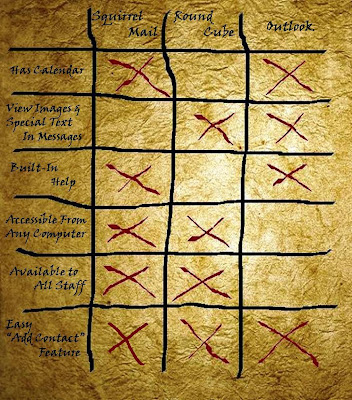HCPL offers access to several different types of eMedia. Here, we're referring specifically to digital media, in the form of eBooks, eAudio and video. Which library product you suggest to a customer will depend on their needs -- for recreational eAudio, eBooks or video, use the HCPL Digital Media Catalog (OverDrive), for children's picture and chapter books try the Digital Media Catalog or TumbleBooks, and for technical and academic ebook titles, use the Safari database or EBSCO eBook Collection (formerly NetLibrary).
Consider the appeal of free library materials available 24/7 from home or on the go. Did you know that each month HCPL eMedia circulates more than a medium-sized library branch, with about one fourth as many items? Knowing how to assist customers with eMedia is an essential skill now and will become more so in the future. To become adept at using these services, you must become comfortable with technology and the idea that technology is in a constant state of change.
Digital Media Catalog
Although many of us use the term "OverDrive," that is actually the name of the vendor that supplies the content for our Digital Media Catalog, the most used HCPL eMedia collection. Audiobooks used to be the most popular content in this catalog, but eBooks now circulate most, followed by music and video. The widespread adoption of eBook readers and Tablet PCs are making it increasing difficult to purchase enough library materials to keep up with demand for eBooks.
Here are some key terms for this content:
- MP3 Audiobook - An OverDrive MP3 Audiobook is an audiobook that has been optimized for download. OverDrive MP3 Audiobooks are compatible with many different devices including many cell phones, PDAs, and most portable music devices, such as iPods.
- WMA Audiobook - An OverDrive WMA Audiobook title is a digitally-protected audiobook that has been optimized for download. OverDrive WMA Audiobook titles are built using the Microsoft® Windows Media® Audio format, which greatly enhances the sound quality for desktop listening, play of CD copies (where permitted by the publisher), and portable device use.
- Adobe Digital Editions - Adobe Digital Editions is a free eBook reader application used to read DRM-protected Adobe eBooks. Adobe Digital Editions must be installed and activated in order to use the DRM-protected Adobe eBooks available at this site.
- OverDrive Media Console - OverDrive Media Console allows you to download and enjoy OverDrive MP3 and WMA Audiobooks on most Windows® and Mac® computers. Use OverDrive Media Console to navigate, play, and bookmark OverDrive titles, and to manage and customize your media library, including easy transfer and CD burning options.
- eBook - 'eBook' is short for 'electronic book', a digital version of a print book that has been optimized for on-screen reading. eBooks are available in a variety of different formats and can be transferred to eBook reading devices that comply with those formats.
On to the Hunt!
Record your entries using the form on Harriet. Be sure to submit when you are done.
- Compatible Devices
- What items from the Digital Media Catalog can be used with an iPad or an iPhone 4? Select all that apply.
- EPUB eBook
- PDF eBook
- OEPUB eBook
- OPDF eBook
- Kindle Book
- MP3 Audio Book
- WMA Audio Book
- WMA Music
- WMV Video
- None of the Above
- What about the Amazon Kindle? Select all that apply. Hint
- EPUB eBook
- PDF eBook
- OEPUB eBook
- OPDF eBook
- Kindle Book
- MP3 Audio Book
- WMA Audio Book
- WMA Music
- WMV Video
- None of the Above
- What about the Barnes & Noble NOOKcolor? Select all that apply?
- EPUB eBook
- PDF eBook
- OEPUB eBook
- OPDF eBook
- Kindle Book
- MP3 Audio Book
- WMA Audio Book
- WMA Music
- WMV Video
- None of the Above
- Search for John Grisham. Sorting by release date, what is the most recently released title available in the Digital Media Catalog and in what formats is it available?
- Find an eBook that appeals to you and check it out to yourself. What are the lending period options when you check out and how many titles can you have checked out at one time?
TumbleBooks are animated picture and chapter books for kids. They are very popular in school settings and have a variety of supplemental options for each book, including puzzles, games and quizzes. Take a tour to learn more and be sure to view a book of your choice.
- Search for John Lithgow. List the titles he narrates.
- Which TumbleBooks collection offers selections for older readers?
- In Language Learning, what four languages are available?
Safari Books Online are accessed through the HCPL databases page on the website. Through Safari, HCPL offers access to over 4,732 current (past three years) technical and business books, titles that would be quite expensive individually. Consequently, it is currently the third most popular database that HCPL provides.
- What is Safari's top title by popularity?
- How do you check out a Safari ebook?
Congratulations! Searching for the answers to these exercises and submitting the form has earned you the eMedia Key to the Treasure Chest! If you have completed the previous 9 modules, you are now finished with the Treasure Hunt!


























